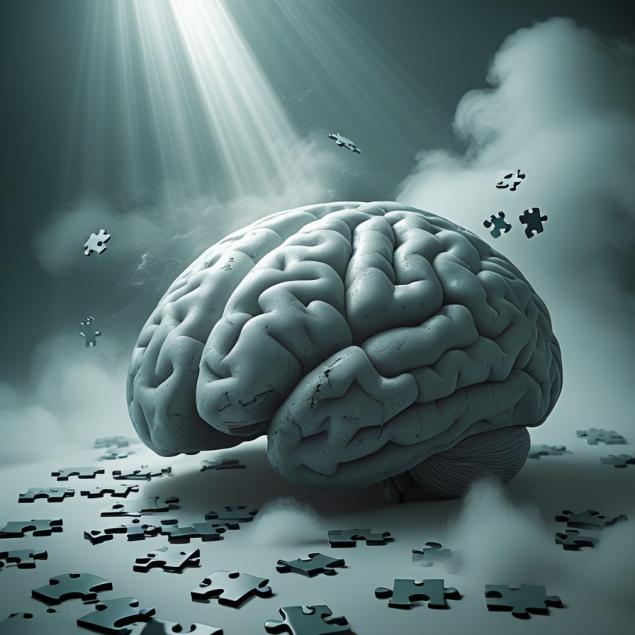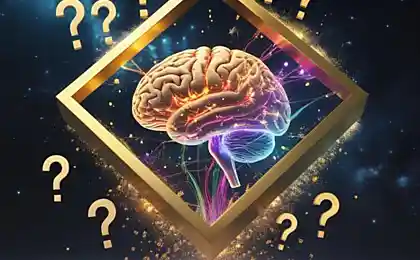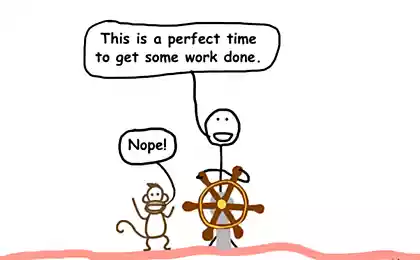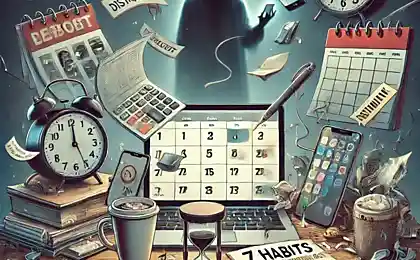138
11 Consequences of Chronic Procrastination That You Can Only See After a Long Time
Imagine an iceberg in the ocean – the visible part seems small, but under the water there is a huge mass of ice that can sink the Titanic. Procrastination works the same way. What we see on the surface — a few missed deadlines, accumulated tasks — is just the tip of the iceberg. The real destructive power of this habit manifests itself years later, when it is already extremely difficult to fix anything.

Chronic procrastination is not just laziness or a bad habit. This is a systemic problem that slowly but surely destroys all areas of human life like an invisible virus.
The Anatomy of Hidden Destruction
A study conducted at the University of Calgary found that 95% of people periodically postpone things for later, but only 20% suffer from chronic procrastination. It is those 20% who face long-term consequences that often become apparent only a few years later.
7 years
The average period after which serious consequences of chronic procrastination appear
11 Hidden Destroyers of Your Future
- Professional reputation: the collapse of trust
When Steve, a talented designer from Silicon Valley, was constantly submitting designs at the last minute, colleagues at first attributed it to the creative process. Three years later, he was no longer invited to important meetings. Five years later, he lost his job at Google. The restoration of his reputation took him seven years and a change of field of activity.
️Critical point: After 18 months of systematic delays, your coworkers begin to see you as an unreliable employee. - Self-esteem: The spiral of self-destruction
Every postponed task is a small blow to your self-esteem. Psychologists call this “accumulated shame.” A person begins to avoid not only tasks, but also situations where his inferiority may manifest itself.
Neurobiological studies show that chronic procrastination changes the structure of the brain, reducing the volume of the prefrontal cortex responsible for decision-making. - Missed Opportunities: The Ghosts of Unfulfilled Dreams
While you delay applying for a grant, launching a startup, or learning a new language, others are acting. Statistics show that procrastinators miss an average of 73% of potential career opportunities. - Physical Health: The Invisible Killer
Chronic stress from constantly putting things off causes a cascade of biochemical reactions: cortisol levels rise, immunity weakens, and the risk of cardiovascular disease increases by 40%.
- Interpersonal relationships: the erosion of trust
Close people start to feel unimportant when you constantly put off promised meetings, conversations, or help. It's not a dramatic rupture - it's a slow cooling that can last for years. - Financial losses: the cost of inaction
Delaying investment, changing jobs or developing skills is expensive. Economists estimate that chronic procrastinators earn an average of 15% less than their more organized counterparts. - Personal Development: Stagnation in the Maze of Comfort
Avoiding complex tasks creates the illusion of security, but actually stops growth. You remain at the same point as the world moves forward. - Emotional burnout: the burden of the unmade
Constant guilt and shame drain emotional resources. It’s like carrying a heavy backpack that gets heavier every day. - Violation of biorhythms: chaos in the body
Attempts to catch up lead to disruption of sleep, nutrition, physical activity. The body loses its natural rhythm, which exacerbates all other problems. - Cognitive function: fog in the head
Constant stress and anxiety reduce the ability to concentrate, remember and make decisions. It's a vicious circle: the more you put off, the worse your brain works.
- Losing the Meaning of Life: An Existential Emptiness
When life turns into an endless pursuit of deadlines, there is no time for joy, creativity, deep reflection. The man begins to feel like a hamster in a wheel.
The Science of Procrastination: What Happens in the Brain
Research by Stanford neuroscientists has shown that chronic procrastinators have a hyperactive limbic system (responsible for pleasure and fear), while the prefrontal cortex (planning and self-control) is weak. This explains why it is so hard to force yourself to do important but unpleasant things.
Five strategies to overcome chronic procrastination
2-Minute Rule Technique: If a task takes less than 2 minutes, do it immediately. This prevents the accumulation of small cases.
The Pomodoro method plus 25 minutes of work + 5 minutes of rest, but with visualization of the final result before each cycle.
Divide large projects into tasks that can be completed in 15-30 minutes. The brain doesn't see them as a threat.
The principle of “the scariest frog” Start the day with the most unpleasant task. After that, everything else will seem easy.
Remember: Procrastination is not a character flaw, it is a skill that can be changed. Every day is a new opportunity to rewrite your story.
Action Plan: From Chronic Procrastination to Productivity
Week 1-2: Diagnosis дел Keep a diary of procrastination. Write down what you put off, when and why.
Week 3-4: Soft changes Start with the simplest tasks. Create a habit of completion.
Week 5-8: Difficulty building п Gradually increase the complexity and duration of tasks.
Week 9-12: Attachment Build support and reward systems for completed tasks.
Conclusion: the time to act - now
Chronic procrastination is not a sentence, but a diagnosis that can and should be worked with. Every day of procrastination increases the cost of inaction, but every day also offers a chance to change everything. Start right now, not tomorrow, not Monday, but this very minute. Your future self will thank you.
Material prepared by the editorial office of the portal Tower Your guide to the world of productivity and personal growth.
Glossary of terms
Chronic procrastination systematic postponement of important tasks for a long period (more than 6 months), leading to significant negative consequences in various spheres of life.
Prefrontal cortex The area of the brain responsible for planning, decision-making, self-control and assessing the consequences of actions.
limbic system The ancient part of the brain that controls emotions, motivation, fears and the fight-or-flight response.
cortisol Stress hormone, a prolonged increase in which negatively affects immunity, memory and general health.
Cognitive functions Thinking processes that include memory, attention, perception, thinking and decision-making.
Pomodoro Method Time management technique, which involves working in short intervals (usually 25 minutes) with short breaks.

























